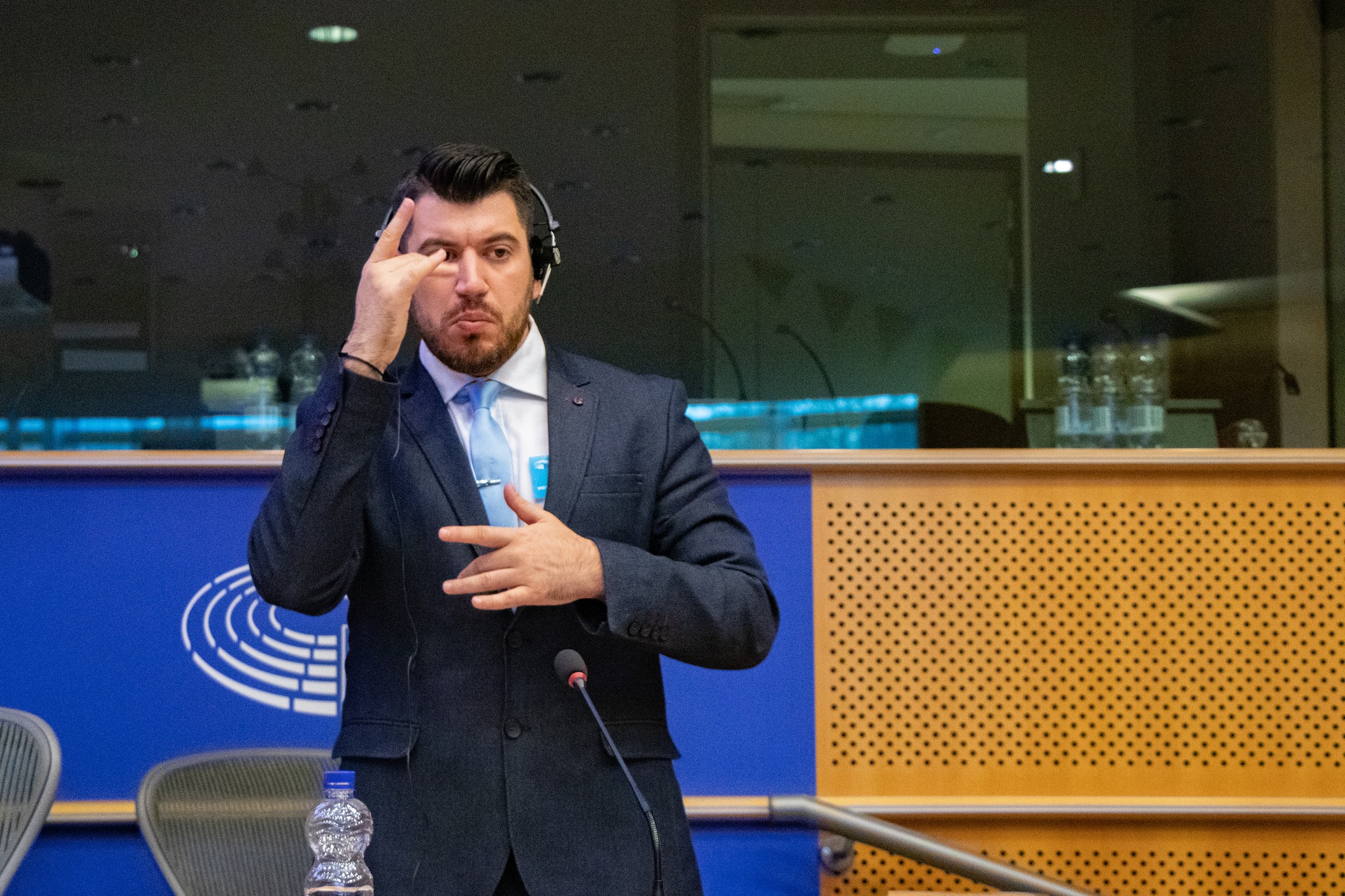
Stories Talk | Presentation Skills and Effective Storytelling
Stories Talk | Presentation Skills and Effective Storytelling
By Mia Kollia
Translated by Alexandros Theodoropoulos
George Stathis has been working as a professional Greek Sign Language Interpreter since 2013. He studied sign language very early in his life. He was 19 at the time and it all started out of personal curiosity about this different language.
He later discovered that sign language was such a fascinating and interesting way of communicating that as the years passed and his basic training came to an end, he decided to pursue a degree in interpreting and to follow sign language professionally.
Thus, he founded the social company “HandsUp”, the first agency for Sign Language Interpreters in Greece. HandsUp has made many different achievements and in fact, in different fields such as culture, education and technology.
In September 2020 the HandsUp team managed to make the first floor of the Museum of Cycladic Art accessible to deaf and hard-of-hearing people through a screen that displays Greek semantic and international meanings for deaf foreign visitors, as well as guidance videos with Greek and English subtitles. They are currently working to make the rest of the floors also accessible to these people.
Furthermore, for a year and a half, the company has been working on the aiD program in collaboration with the Cyprus University of Technology and many other innovative companies and organisations. This is a very ambitious project that aims in creating an algorithm that will be able to convert Sign Language into written text and vice versa, with the help of artificial intelligence.
Understandably, the satisfaction that George Stathis receives from the great venture of HandsUp, both personally and collectively, is great.
"Creating services that aim to improve the quality of human life is a huge satisfaction for you."
However, the truth is that both the institutions served by HandsUp and the final recipient of its services - deaf and hard-of-hearing people - always express their gratitude and joy generously, and this of course is the driving force to continue their work with more fervour.

Despite this, while times have changed by leaps and bounds in many sectors, "racist" attitudes have not yet disappeared. People with disabilities, in addition to the lack of state care, have to deal daily with behaviours by uninformed and reluctant citizens, employees, employers and so on.
"In theory, the intentions and plans for accessibility seem to be the best, but in practice, things are quite different. The positive thing, of course, is that steps are taken, not quickly, but they are".
By attempting a comparison with foreign countries, certainly some of them provide services and facilities to their deaf and hard-of-hearing citizens much more advanced than ours as well as holistic solutions.
However, it is very optimistic that in recent years, Greece, especially through the private sector, is constantly taking steps towards a more accessible and inclusive society. Regarding the inclusion of sign language as a subject to be taught in schools, George Stathis is in favour of this proposal as he believes that it would be a very beneficial addition, not only for the deaf society - obviously a wider audience learning their language would serve all their daily communication needs - but it would also be valuable to any listeners.
"Based on research and due to the fact that it is articulated by the hands, facial expressions and the body, sign language activates parts of the brain that spoken languages do not. Also as a very expressive language, it makes the person who learns it and uses it, in general, more expressive and open to stimuli".
Apart from the world of interpretation, George Stathis is also engaged with the magic world of writing. He started writing novels at the age of 15, creating fantasy worlds, heroes and dark enemies. But at that stage of his life he chose to keep these to himself. After a few years he felt that it was time for his imagination to come into existence, so he published his first books.
Thus, in September 2019 he published his first literary book and two more short stories followed. In February 2021, his first children's fairy tale was published, which is also the first universally accessible fairy tale in Greece, with an audio narration but also video in sign language.
"Personally, I think that the fantasy worlds developed through books are not just a way to escape, but a perspective to see reality with new eyes. By writing fiction books, I unwind as I find a way to send messages to my readers and challenge them to see issues such as disability, racism, solidarity and diversity, through a different perspective. Literature can isolate these issues and make the reader recognise them in real life, through the pages of the books".
#HisStory